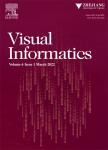A visual analytics system for optimizing the performance of large-scale networks in supercomputing systems
作者机构:University of CaliforniaDavisUnited States Argonne National LaboratoryUnited States Rensselaer Polytechnic InstituteUnited States
出 版 物:《Visual Informatics》 (可视信息学(英文))
年 卷 期:2018年第2卷第1期
页 面:98-110页
核心收录:
学科分类:08[工学] 0812[工学-计算机科学与技术(可授工学、理学学位)]
基 金:This research was sponsored by the Advanced Scientific Computing Research Program,the Office of Science,U.S Department of Energy through grants DE-SC0014917,DE-SC0012610,and DE-AC02-06CH11357
主 题:Supercomputing Parallel communication network Dragonfly networks Time-series data Performance analysis Visual analytics
摘 要:The overall efficiency of an extreme-scale supercomputer largely relies on the performance of its network *** of the state of the art supercomputers use networks based on the increasingly popular Dragonfly *** is crucial to study the behavior and performance of different parallel applications running on Dragonfly networks in order to make optimal system configurations and design choices,such as job scheduling and routing ***,in order to study these temporal network behavior,we would need a tool to analyze and correlate numerous sets of multivariate time-series data collected from the Dragonfly s multi-level *** paper presents such a tool-a visual analytics system-that uses the Dragonfly network to investigate the temporal behavior and optimize the communication performance of a *** coupled interactive visualization with time-series analysis methods to help reveal hidden patterns in the network behavior with respect to different parallel applications and system *** system also provides multiple coordinated views for connecting behaviors observed at different levels of the network hierarchies,which effectively helps visual analysis *** demonstrate the effectiveness of the system with a set of case *** system and findings can not only help improve the communication performance of supercomputing applications,but also the network performance of next-generation supercomputers.



